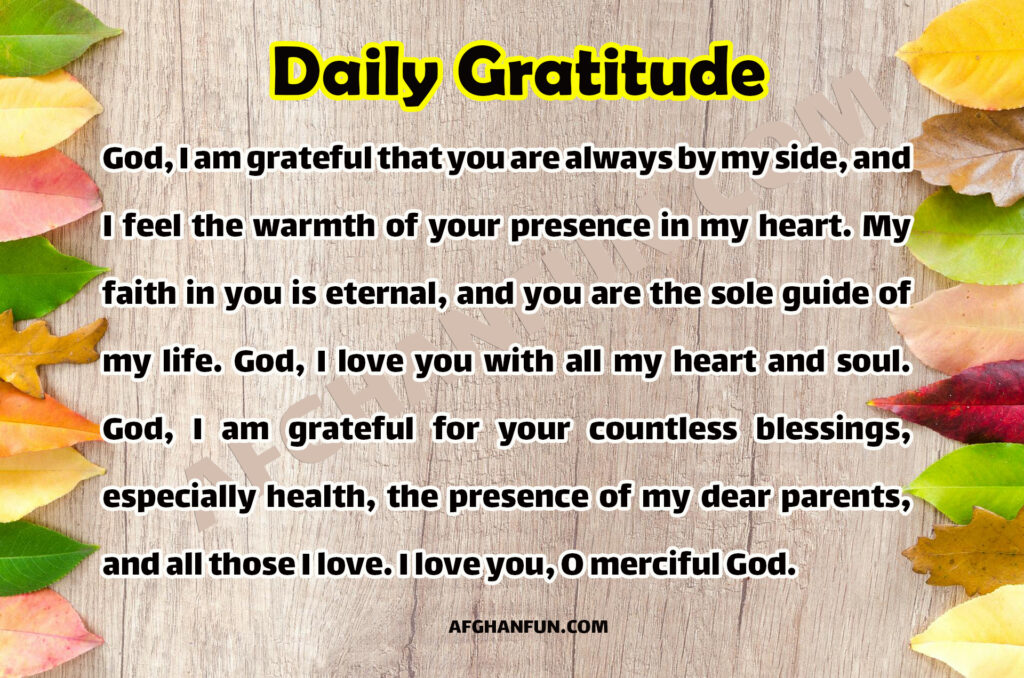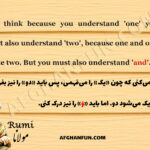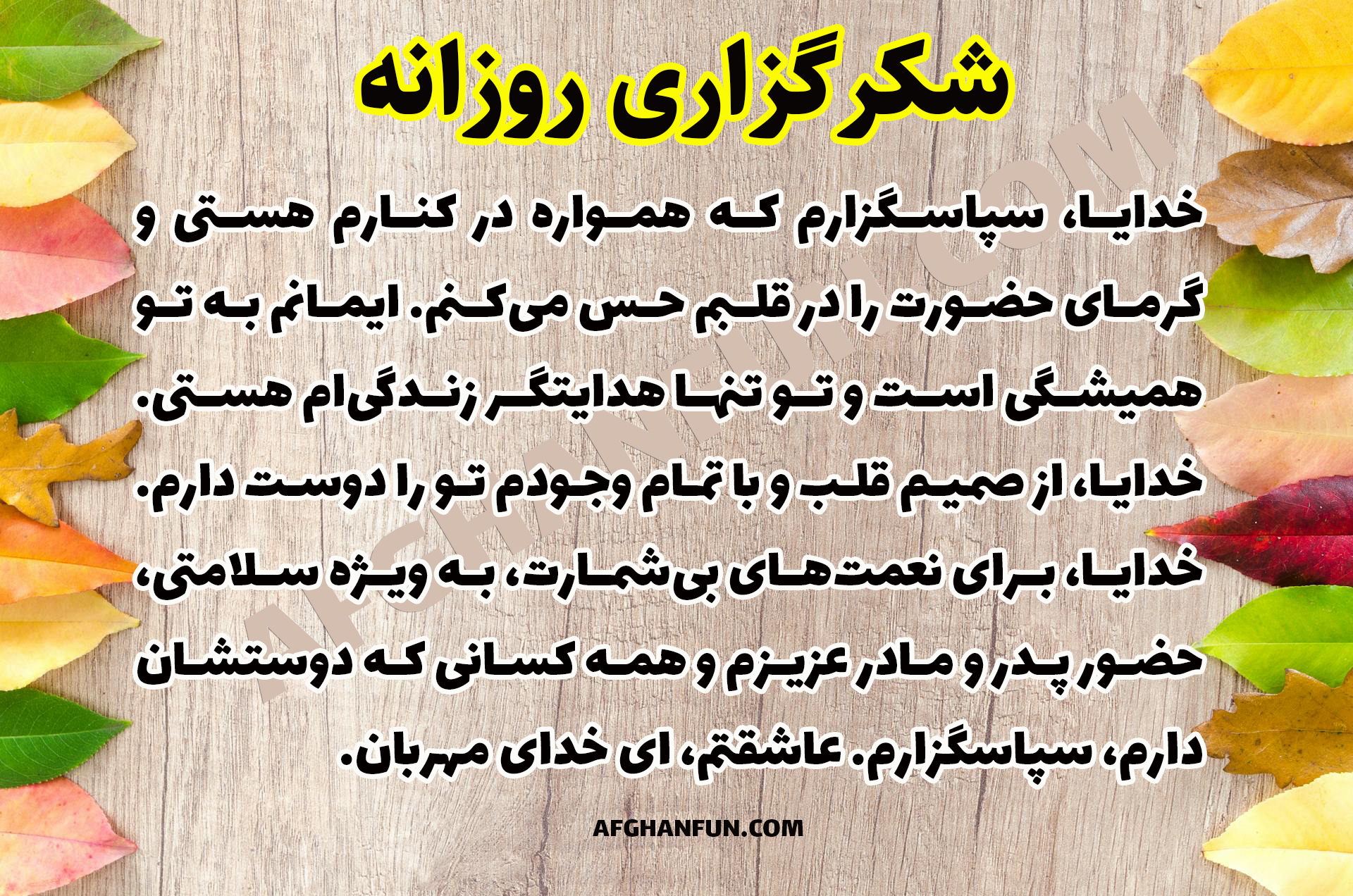
Expressing Deep Gratitude to God
God, I am grateful that you are always by my side, and I feel the warmth of your presence in my heart. My faith in you is eternal, and you are the sole guide of my life. God, I love you with all my heart and soul. God, I am grateful for your countless blessings, especially health, the presence of my dear parents, and all those I love. I love you, O merciful God.
خدایا، سپاسگزارم که همواره در کنارم هستی و گرمای حضورت را در قلبم حس میکنم. ایمانم به تو همیشگی است و تو تنها هدایتگر زندگیام هستی. خدایا، از صمیم قلب و با تمام وجودم تو را دوست دارم. خدایا، برای نعمتهای بیشمارت، به ویژه سلامتی، حضور پدر و مادر عزیزم و همه کسانی که دوستشان دارم، سپاسگزارم. عاشقتم، ای خدای مهربان.
Худоё, сипосгузорам, ки ҳамеша дар канорам ҳастӣ ва гармии ҳузуратро дар қалбам ҳис мекунам. Имони ман ба ту абадист ва ту танҳо ҳидоятгари зиндагиам ҳастӣ. Худоё, аз самими қалб ва бо тамоми вуҷудам туро дӯст дорам. Худоё, барои неъматҳои бешуморат, ба вижа саломатӣ, ҳузури падар ва модари азизам ва ҳама касоне ки дӯсташон дорам, сипосгузорам. Ошиқатам, эй Худои меҳрубон.
إلهي، أنا شاكرٌ لك لأنك دائمًا بجانبي، وأشعر بدفء حضورك في قلبي. إيماني بك أبدي، وأنت الهادي الوحيد لحياتي. إلهي، أحبك من كل قلبي وروحي. إلهي، أنا شاكرٌ لنعمك التي لا تُحصى، وخاصةً الصحة، ووجود والديّ العزيزين، وجميع من أحبهم. أحبك يا إلهي الرحيم.
This gratitude text expresses deep spiritual reverence and acknowledgment of God’s presence in the speaker’s life. Here’s a breakdown of its key elements:
Structure and Form:
- Repetition: The text uses the phrase “God” multiple times, which emphasizes the direct address to the divine. The repetition serves to underline the personal and intimate relationship the speaker has with God.
- Formulaic Expressions: Phrases like “I am grateful,” “I love you,” and “I feel the warmth” are commonly seen in religious expressions of gratitude, suggesting a traditional or learned way of expressing devotion.
Content Analysis:
- Gratitude for Presence: The acknowledgment of God’s constant presence (“always by my side”) indicates a belief in an omnipresent deity, providing comfort and companionship. This is further emphasized by the sensation of “warmth in my heart,” which symbolizes emotional and spiritual fulfillment.
- Faith as Identity: The statement “My faith in you is eternal” not only expresses a belief but also positions this faith as a core, unchanging part of the speaker’s identity. The use of “eternal” conveys a sense of permanence and commitment.
- Guidance: Calling God “the sole guide of my life” suggests a life philosophy where divine will supersedes personal or human guidance, highlighting a complete surrender to divine authority.
- Love and Devotion: The expression of love “with all my heart and soul” is profound, indicating a holistic engagement of the self in the relationship with the divine. This is not just gratitude but an expression of deep affection and loyalty.
- Specific Blessings: The gratitude extends to specific aspects of life, namely health and family (“my dear parents, and all those I love”). This shows a personal acknowledgment of God’s influence in tangible, everyday aspects of life, making the gratitude more relatable and personal.
- Mercy: The final address, “O merciful God,” highlights an attribute of God that the speaker particularly cherishes or has experienced, suggesting a relationship where mercy is pivotal.
Psychological and Emotional Insights:
- Emotional Dependency: The text might reflect an emotional dependency on spiritual beliefs for personal well-being and life guidance. This could be seen as a source of strength or potentially a point of vulnerability if the faith is challenged.
- Community and Tradition: The language used might be indicative of belonging to a community with shared religious practices or could be influenced by religious teachings or texts, reflecting a cultural or familial tradition in how one expresses faith.
- Coping Mechanism: The gratitude towards health and family could be seen as a way to cope with life’s uncertainties by attributing positive outcomes to divine intervention, offering psychological comfort and reducing anxiety about control over life events.
Cultural Context:
- Religious Influence: The text aligns with expressions often found in monotheistic religions, particularly Christianity and Islam, where personal relationships with God are emphasized through prayer and gratitude.
- Global Perspective: While the sentiment could resonate with various religious traditions, the specific wording might be more common in certain cultural or linguistic contexts where such phrases are part of liturgical or daily prayer life.
Conclusion:
This gratitude text is not just an expression of thanks but a multifaceted reflection of the speaker’s spiritual life, emotional dependency on faith, and cultural or communal religious practices. It shows a person who finds profound comfort, love, and guidance in their belief, with a clear prioritization of spiritual over material or personal achievements.











